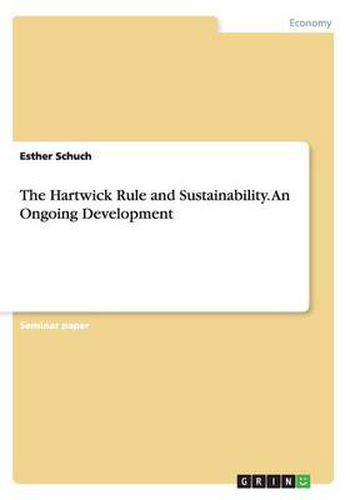Readings Newsletter
Become a Readings Member to make your shopping experience even easier.
Sign in or sign up for free!
You’re not far away from qualifying for FREE standard shipping within Australia
You’ve qualified for FREE standard shipping within Australia
The cart is loading…






Seminar paper from the year 2014 in the subject Economy - Environment economics, grade: 1,3, University of Trier, course: Environmental Economics, language: English, abstract: Contemplation of the world’s disappearing supplies of minerals, forests, and other exhaustible assets has led to demands for regulation of their exploitation. The feeling that these products are now too cheap for the good of future generations, that they are being selfishly exploited at too rapid a rate, and that in consequence of their excessive cheapness they are being produced and consumed wastefully has given rise to the conservation movement (Hotelling 1931, 139). Already in 1931 Hotelling described aptly the problem concerning sustainable management of resources in order to ensure intergenerational equity. More than 80 years later the problem still has not been solved but a lot of work has been done in order to nd a remedy. One major contributor is John Hartwick with his rule concerning how to keep consumption constant if the economy runs partially on exhaustible resources. This paper starts with a short introduction to three different concepts of sustainability. It continues to give an overview of relevant research prior to Hartwick. The main part consists of the original Hartwick rule which is discussed in some depth. In the following priority is given to adaptations to the rule done by Hartwick himself over those by other economists. Obviously, it is not possible to cover every work in this regard. Rather, the work chosen tackles those aspects that are viewed most critically and were fairly close in time to release to the original Hartwick rule.
$9.00 standard shipping within Australia
FREE standard shipping within Australia for orders over $100.00
Express & International shipping calculated at checkout
Seminar paper from the year 2014 in the subject Economy - Environment economics, grade: 1,3, University of Trier, course: Environmental Economics, language: English, abstract: Contemplation of the world’s disappearing supplies of minerals, forests, and other exhaustible assets has led to demands for regulation of their exploitation. The feeling that these products are now too cheap for the good of future generations, that they are being selfishly exploited at too rapid a rate, and that in consequence of their excessive cheapness they are being produced and consumed wastefully has given rise to the conservation movement (Hotelling 1931, 139). Already in 1931 Hotelling described aptly the problem concerning sustainable management of resources in order to ensure intergenerational equity. More than 80 years later the problem still has not been solved but a lot of work has been done in order to nd a remedy. One major contributor is John Hartwick with his rule concerning how to keep consumption constant if the economy runs partially on exhaustible resources. This paper starts with a short introduction to three different concepts of sustainability. It continues to give an overview of relevant research prior to Hartwick. The main part consists of the original Hartwick rule which is discussed in some depth. In the following priority is given to adaptations to the rule done by Hartwick himself over those by other economists. Obviously, it is not possible to cover every work in this regard. Rather, the work chosen tackles those aspects that are viewed most critically and were fairly close in time to release to the original Hartwick rule.